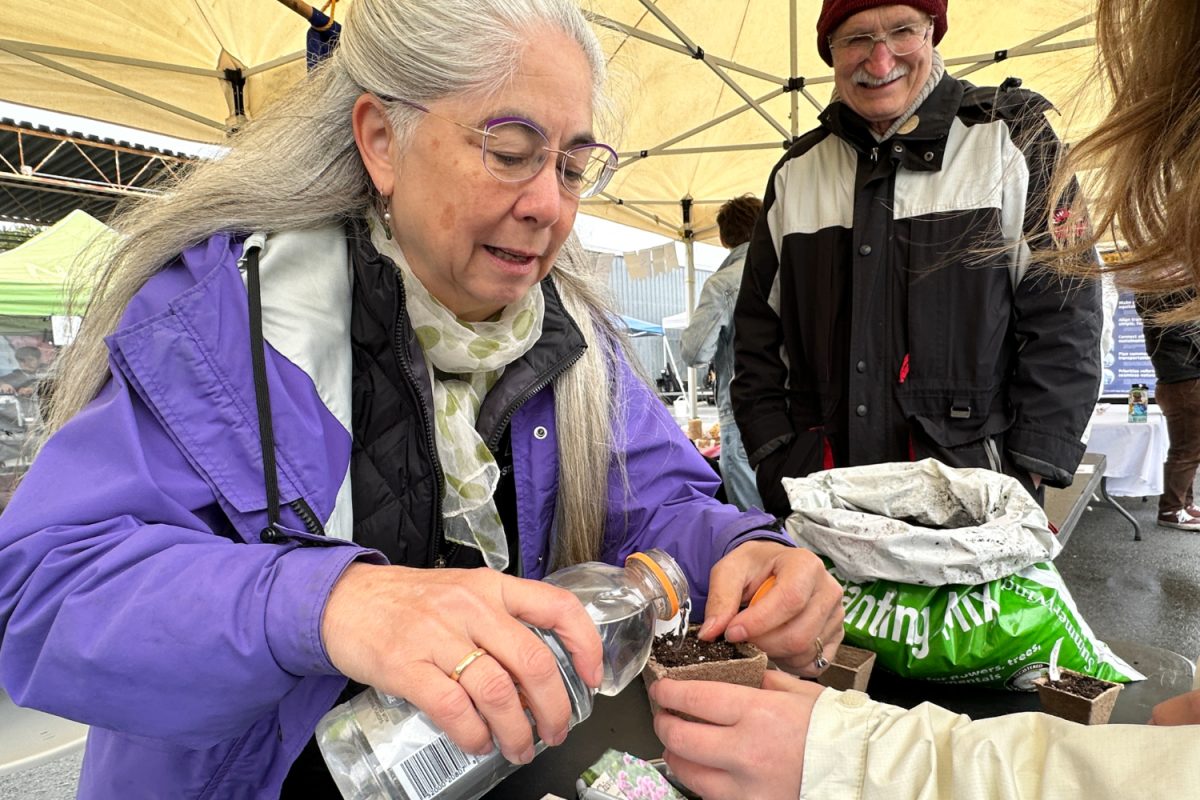Lily Zheng remembers a time when she thought she was going to burst. It was one day during her junior year as students at Carlmont High School rushed to their next class.
For the 18-year-old who was born biologically male, but has identified as female since she was young, using a bathroom at school was not an option.
Zheng was given a verbal warning by a school administrator after she was reported by a female student for using the female restroom. The student said she was uncomfortable with Zheng’s biological sex and Zheng was forced to use the private staff restrooms throughout the rest of high school.
“I could not even make up an excuse in my head for how I couldn’t be ‘girl enough’ to use the right restroom. I was angry at the administration and those students too ignorant to understand, and angry at myself for attracting the negative attention of their ignorance. I was being singled out for who I was,” Zheng said, now a freshman at Stanford University.
Zheng is one of many transgender students in the United States who have found themselves in uncomfortable situations when it comes to using the restroom.
California law prohibits discrimination in education, but a number of transgender students are still excluded from athletic teams and bathroom rights across the country.
And while a number of schools across the country have Gay-Straight Alliance clubs to support gay, lesbian and transgender students, creating a safer environment for transgender students has begun to percolate as a leading issue in education.
With the rise of students identifying themselves as transgender, schools have begun to consider installing unisex bathrooms to help avoid any definitive gender symbols and to remain neutral to not offend anyone from different backgrounds or self-identifications. Transgender advocacy groups see unisex bathrooms as a solution to eliminate harassment for trans people when using conventional bathrooms at schools.
The Gay, Lesbian and Straight Education Network National School Climate Survey in 2011 reported that 39 percent of the transgender students said they did not feel safe in school bathrooms. Lawmakers in California hope the implementation of unisex bathrooms in all schools will help lower the rates of discrimination against these students.
19-year-old transgender student Zoey Lema, who was also born biologically male but now considers herself a female, said that unisex bathrooms would be a safe place for gender nonconforming students and allow them to feel more comfortable about their sexual identity.
“I’ve have been lucky to not have experienced any bathroom discrimination at my own school, but I’m sure other students have. It’s not fair because everyone expels waste the same way, so discrimination shouldn’t happen,” said Lema.
Grant High School in Portland, Ore. became one the first high schools in the country to install unisex bathrooms for transgender students. Seventeen other states in the US also have similar policies that protect against discrimination based on sexual orientation and gender identity. California is following their footsteps-as The Los Angeles Unified School District, the largest school district in California, has allowed its transgender students from kindergarten through high school to choose to use the bathroom or locker room of the gender they identify with.
In light of growing awareness and understanding of the gender binary, the California Assembly and Senate passed the School of Success and Opportunity Act on July 6, which will ensure that California public schools understand their responsibility of the success and well-being of all students. This will allow transgender students to be permitted to participate in athletic teams,competitions, and use the restroom consistent with his or her gender identity, irrespective of the gender listed on the student’s record. The law was signed by Gov. Jerry Brown on Aug.12.
“I’m happy that the new law was passed, but I’m a bit irritated that schools in California couldn’t come up with that piece of legislation themselves in their own anti-discriminatory policy without the state pushing them,” commented Zheng.
This is the first state law in the nation that requires equal access to public school facilities and activities based on gender identity. If passed, parents, school administrators and board members would have no say over students who identify themselves as trans and enter shower rooms or bathrooms used by the opposite sex.
Constance McEntee, a 43-year-old transsexual and technical support analyst and writer for Epocrates, an athenahealth company in San Mateo, Calif., said that schools should place gender segregated and unisex bathrooms due to the variety of expressions and identities along the gender spectrum that can be found today.
“There might be those youths who would try to use these to spy on the objects of their desires. Simply having such bathrooms would not be good enough. Education, as well as a strict anti-harassment policy, would be needed too,” said McEntee.
Public restroom use is governed by a legal patchwork of city and town ordinances and state laws. In 2005, San Francisco was one of five cities in the U.S. with regulations protecting public restroom access based on “gender identity,” which refers to a person’s internal sense of gender rather than their birth sex. Although there has been no law that establishes public places to provide unisex restrooms, having them prevents students from being discriminated.
A study conducted by UCLA’s Williams Institute revealed that there are around 700,000 transgender individuals in the United States. Colleges in California that already have unisex restrooms include UCLA and UC San Diego.
Today, the Transgender Law center has been working in affiliation with the organization People In Search of Safe Restrooms (PISSR) to campaign for gender-neutral restrooms in San Francisco. Supporters say the bill represents the next front in their effort to provide equal rights for lesbian, gay, bisexual and transgender individuals.
“Just because someone or some people feel uncomfortable about have a transgender person in the restroom doesn’t mean it gives them a right to discriminate against them,” said Communications manager of Transgender Law center Mark Synder.
In 2001, the PISSR organization surveyed 487 transgender, gender-queer, lesbian, gay and bisexual people in San Francisco. The study revealed that found that 99 percent of the people surveyed wanted gender-neutral bathrooms.
As schools continue to implement these restrooms, it has caused an impassioned debate about when transgender students’ right to expression might conflict with other students’ discomfort and right to privacy and the school’s resources. Steven Tsujisaka, a 19-year-old anti-bullying activist and sophomore student at College of San Mateo, stated that schools need to provide other students with options.
“Some people do not like the concept of unisex bathrooms, and forcing them to adapt to your ideal bathroom situation is just as bad as people discriminating against transgender people,” said Tsujisaka.
Questions of both sexual harassment and sexual rendezvous happening within a unisex bathroom have also arisen with a negative response.
“There needs to be a test or some sort of identification. I would freak out if some girl went into the men’s bathroom,” said 18-year-old freshman at San Jose State University Alexander Lee.
Zheng believes that more schools will continue to modify its policies and place unisex restrooms as more students come out as transgenders. She added that this trend will continue, but it will take a long time until all schools across the nation will create unisex bathrooms.
“Transgender students are not a particularly visible minority. Unless something drastic occurs, I will be lucky to see a nationwide adoption of this policy for public schools during my lifetime. But I hope I do. No one should be afraid or banned to use the bathroom like I was,” she said.







